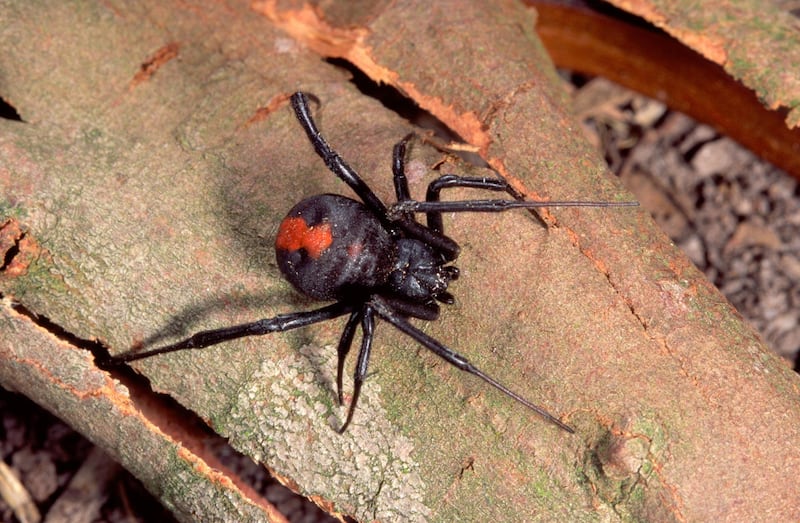Potentially lethal redback spiders are on the rise in the UAE — as they travel into the country inside imported plants and fruit and even people's luggage.
The venomous spider is more commonly found in Australia and Asia, but there has been a recent surge of sightings in the UAE.
While there have been no deaths attributed to the venomous spider in the UAE, a leading doctor has urged people who think they might have been bitten by a redback to seek out treatment.
One person who believes they may have been the victim of a redback bite is Lee Tunnicliffe of Dubai.
______________
Read more:
[ Meet the indigenous poisonous creatures of the UAE ]
______________
Doctors told the 38-year-old sales manager for Dance FM that she could have died if she had delayed getting hospital treatment any longer after being bitten last month.
“I don’t know when I was bitten, I only noticed it when I brushed up against a desk at home and felt an unusual amount of pain. The bite looked like a golf ball with two fang marks in it,” she said.
“When I went to the pharmacy they told me to keep aloe vera on it and not to worry, as you can’t get poisonous spiders over here.”
Six days later, the bite had increased in size so much so that Ms Tunnicliffe, from Scotland, was advised to go to hospital by her mother.
“They told me it was quite serious and it was definitely a bug bite.
“I had a skin infection called cellulitis that had been caused by the skin being broken. The pain was white hot and searing, each day I drew a circle around it to see if it was getting bigger.
“At one point the redness was the size of a badminton racket head.”

She said she is still in a lot of pain, despite treatment for the bite.
“It feels like a burn. The doctor said if I had left it any longer, the infection could have got into the lymph nodes in my blood and it could have been fatal,” she said.
Dr Yusr Jaafir, from Medeor 24x7 International Hospital, Al Ain, said that while redback spiders are still not common in the UAE there is definitely an increase in sightings.
The creatures, named after the prominent red stripe on their back, are diminutive in size, growing to a length of about 10 millimetres for females and less than half that for males.
“We are seeing more of them around communal areas such as gardens and pools,” said Dr Jaafir.
“If you think you have been bitten then you need to get yourself to a government hospital immediately to receive the anti-venom,” she said.
While redback spider bites tend to look like small pin pricks they can be deadly in some cases.
“While we have not have had any deaths in the UAE from redback spider bites, they can still be extremely dangerous,” she said.
“The problems arise when the venom gets into your system and causes chest and stomach pains, the advanced stages can cause a lot of sweating, high blood pressure and hallucinations.”
_______________
Read more:
Poisonous spiders spotted in Dubai communities
Meet the poisonous creatures of the UAE
_______________
Alan Dickson, who founded the Ridapest pest control company in Dubai in 1982, said he has encountered redbacks in Dubai, Hatta and Al Ain.
“I only once encountered redbacks indoors at an entrance to a kitchen in Jumeirah in the 1980s,” said Mr Dickson, from Scotland.
“However they are very common outdoors especially around buildings and places like car ports and garages.
“I had many around my house over my 19 years while living in the old Jebel Ali Village. I also came across them on pavements on Sheikh Zayed Road near the World Trade Centre.”
He said many people confused redback spiders with jumping spiders, which are common in villas in the UAE.
Tim Husband, technical director at Dubai Safari, agreed that redbacks were increasing in numbers.
“They are not native but the number of sightings is increasing,” he said.
“Normally they travel in people's luggage from places such as Australia or South-East Asia or in imported goods such as fruit and packaging.”
He said the first thing that someone should do, if they believe they are bitten, is not to move around much as this will only increase the blood flow and spread the poison.
“You need to strap the area and limb with a firm bandage, call an ambulance and relax. You have plenty of time to get to the hospital,” he said.
“It’s only the female that is poisonous and for an adult it is often not fatal, but it will make you very sick. Young children and pets are the most at risk.”

British expat Nicola Forestiero, 37, from Manchester, said her pet dog Holli had been bitten by a spider in 2015, when her family had first moved to Dubai.
“It was horrific. We took the dog out for a walk in the sand and when we took her home she went to bite my husband as if she was in serious pain,” she said.
“Her leg was swelling up and we had to take her to the vets and they had to fight to save her life and her leg.
“The vet told us she had been bitten by a spider and her body was shutting down with the poison.”







